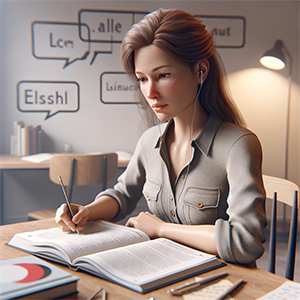Lesson 12
Simple Questions and Answers

Hello dear students!
I’m Ewa, your German teacher. I hope your morning was as pleasant as mine. Today’s coffee and sunshine put me in a positive mood for the rest of the day. As always, I look forward to our lesson with great enthusiasm.
Today, in our 12th German lesson series for caregivers of the elderly on the Hrily platform, we will focus on simple questions and answers that are key to everyday communication. As caregivers, you often find yourself in situations where clear and understandable questions can help you both care for and build relationships with older people.
German vocabulary for carers
In today’s lesson, we will learn 10 new words related to care and everyday life. Below is a list of these words in English and their German equivalents:
- Caregiver – Der Betreuer
- Senior – Der Senior
- The drug – Das Medikament
- The Walk – Der Spaziergang
- Cooking – Das Kochen
- Shopping – Die Einkäufe
- Interview – Das Gespräch
- Help – Die Hilfe
- Patience – Die Geduld
- Smile – Das Lächeln
Communication is the key to effective care, so we will focus on the practical use of learned words in everyday dialogues.
Before we get to the main topic of the lesson, I would like to touch on one important aspect of our work. Many of you work with care agencies, including those specializing in the care of seniors. It is significant to choose those that are recommended and offer support throughout the care process. Remember that a good agency is not only about formalities, but also about support and advice in difficult times.
Now that we know today’s vocabulary, let’s move on to practical exercises that will help you communicate better in German.
Example dialogues – everyday phrases and expressions
Dialogue 1: Ask for help in the garden
Ewa: Herr Martin, können Sie mir helfen, die Blumen im Garten zu gießen? (Mr. Martin, can you please help me water the flowers in the garden?)
Martin: Natürlich, Ewa. Das mache ich sehr gerne. Wo steht die Gießkanne? (Of course, Eva. I’d love to. Where’s the watering can?)
Dialogue 2: Planning the day
Ewa: Was möchten Sie heute Nachmittag tun, Herr Martin? Vielleicht ein Spaziergang im Park?(What would you like to do this afternoon, Mr. Martin? How about a walk in the park?)
Martin: Ja, ein Spaziergang klingt gut. Ich würde gerne die neuen Blumen im Park sehen.(Yes, the walk sounds good. I would like to see the new flowers in the park.)
Dialogue 3: Reading together
Ewa: Herr Martin, ich habe ein Buch über deutsche Geschichte. Würden Sie es gerne zusammen lesen? (Mr. Martin, I have a book on German history. Would you like to read it together?
Martin: Sehr gerne, Ewa. Geschichte ist eines meiner Lieblingsthemen. Welches Buch ist es? (Very willingly, Eva. History is one of my favorite subjects. What kind of book is this?)
These dialogues illustrate the natural exchange between Eva and Martin, reflecting their daily activities, interests, and simple but important communication. Ewa uses simple German to facilitate communication, and Martin responds in a supportive and friendly way.
Interactive Exercises: Strengthening Language Skills

Task 1: Creating Dialogs
Objective: To improve communication skills in the context of working as a caregiver for an elderly person in Germany. Use of vocabulary from today’s lesson.
Task description: Create a dialogue between the caregiver and the elderly person you are caring for. Use the words and phrases from today’s lesson, especially those related to daily activities and healthcare.
Example:
- Ewa (caregiver): Guten Morgen, Herr Schmidt. Brauchen Sie Hilfe beim Anziehen? (Good morning, Mr. Schmidt. Do you need help getting dressed?)
- Herr Schmidt (senior):Ja, bitte. Und könnten Sie mir auch meine Medikamente geben? (Yes, please. And please give me my medication.)
Tip: Remember to use polite phrases and a polite tone, which is key when working with older people.
Task 2: Description of a Typical Day
Objective: To develop vocabulary related to everyday activities and routine of care for the elderly.
Job description: Write a brief description of a typical working day as a caregiver for an elderly person in Germany. Use the words and phrases from today’s lesson to focus on activities such as preparing meals, walking, reading books or talking.
Example:
- Mein Tag beginnt mit der Vorbereitung des Frühstücks für Frau Müller. Wir frühstücken zusammen und sprechen über ihre Lieblingsmusik. Danach helfen ich ihr bei der Einnahme ihrer Medikamente und wir gehen einen kurzen Spaziergang im Garten machen.(My day starts with preparing breakfast for Mrs. Müller. We have breakfast together and talk about her favorite music. Then I help her with her medication, and we go for a short walk in the garden.)
Tip: Focus on the details that may be important in the context of care, such as understanding the needs of the senior and adapting actions to them.
These assignments are aimed not only at language learning, but also at preparing students for the practical aspects of working as a caregiver for the elderly in a German-speaking environment. By practicing real-world scenarios, students will be better prepared for the challenges of this responsible and demanding role.
Interesting facts about the German language
A curiosity of the German language is the word Feierabend, which literally means the evening after work, but carries with it a more profound meaning. Feierabend has a more in-depth meaning for Germans – it is a symbol of the end of work and time to rest, relax or spend time with family. In German culture, it is vital to maintain a balance between work and private life.
This aspect of German culture shows how critical it is to understand not only the language, but also the culture of the country where we work. Knowing such nuances, we can better adapt to the needs and expectations of our seniors, as well as take care of our own mental and physical well-being.
Remember, learning a language is also about discovering culture and customs, which is extremely essential in the work of a caregiver for the elderly, especially in an international environment. Let this little insight into German culture inspire you to continue learning and understanding this beautiful language!
Summary of Lesson 12: German for caregivers – simple questions and answers

Congratulations on completing our 12th lesson. The words and phrases collected today will become a valuable tool in your communication with seniors. The dialogues we practiced together show how influential it is to be able to ask simple questions and answer them. Remember that communication is the key to understanding and effective care.
I hope the practical exercises were inspiring for you and helped you feel more confident in using German. Remember that every lesson brings you closer to the goal of fluent communication in German.
Invitation to the next lesson
I cordially invite you to our next lesson entitled Directions and Spatial Orientation. This will be an extremely useful lesson, where we will learn how to navigate the German-speaking world, how to describe the position of objects and how to give clues. These are significant skills, both in everyday life and in the work of a caregiver.
See you in the next lesson, where together we will discover more aspects of the German language that will make it easier for you to communicate and navigate in the German-speaking world. Get ready for another portion of knowledge, practical exercises and interesting facts that will bring you closer to fluent communication in German.
See you soon!